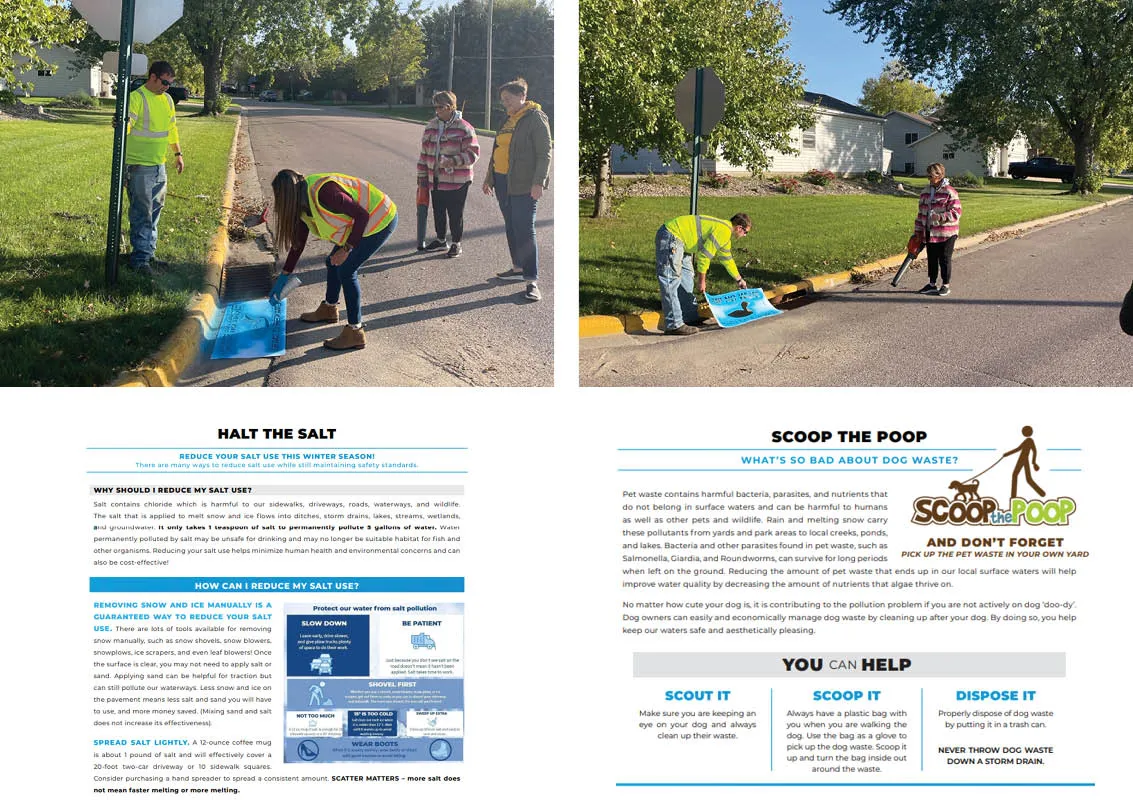Navigating the MS4 Permit Program: How ISG Supports Communities Every Step of the Way
The management of stormwater runoff is a pressing concern for cities across the nation, and the Municipal Separate Storm Sewer System (MS4) permit program is a critical framework designed to protect water quality and our natural resources. ISG’s Water team understands the challenges that cities face in navigating this complex regulatory landscape and why we partner with cities to provide complete support to communities large and small.
Understanding the MS4 Program
The MS4 program, established under the Clean Water Act, sets forth a series of requirements for cities with populations typically larger than 10,000 people. Participating cities must comply with six annual Minimum Control Measures (MCMs) to manage and reduce the pollution of stormwater runoff. These measures cover a range of activities, from public education and outreach to construction site runoff control and post-construction stormwater management.

ISG's Role in MS4 Compliance
For many cities, resources and staff are limited, and complying with the MS4 program can present significant challenges. That's where ISG comes in. We provide three arms of service and support, including:
1. Permitting Assistance - From completing initial permitting applications to reapplying for coverage under the general permit every five years, ISG offers support to streamline the permitting process for MS4communities.
2. Program Implementation and Management - Once permitted, ISG works closely with municipalities to ensure ongoing compliance with the six MCMs. Through quarterly meetings and a detailed checklist of requirements, we guide city staff in meeting their permitting requirements and maintaining program integrity.
3. Public Education and Outreach - Raising awareness about stormwater pollution is essential for fostering community adoption of stewardship practices that increase the longevity of infrastructure and meet water quality requirements. ISG leads public education and involvement initiatives, encouraging residents to take action to protect water quality.
Case Study: City of Eagle Lake, Minnesota
Despite being smaller than the typical cities covered under theMS4 program, the City of Eagle Lake became eligible due to its proximity to a rapidly expanding metropolitan area, and therefore must adhere to the same regulatory and programmatic requirements as larger MS4 cities. Recognizing the challenges posed by limited staff and resources, the City sought assistance from ISG to navigate the complex landscape of MCM compliance. This partnership allowed Eagle Lake to offset its resource limitations and fulfill its stormwater management obligations effectively.
Permitting Support
In 2016, ISG helped the City to secure initial permit coverage under the Minnesota Pollution Control Agency (MPCA) MS4 General Permit. Since then, our environmental team has provided ongoing support to ensure compliance with permit requirements, including obtaining reauthorization under the 2020 general permit. This involved conducting a thorough gaps analysis between the 2016 and 2020 MS4 Permits to identify necessary management activities. ISG evaluated past records, storm sewer assets, and existing procedures to complete the Application for Reauthorization, addressing Total Maximum Daily Load (TMDL) requirements.
Program Implementation + Management
Ongoing management services are provided by ISG staff, including quarterly meetings to review progress and documentation, and updates to regulatory mechanisms and the development of Enforcement Response Procedures. ISG staff also maintain GIS mapping of the storm sewer system, address illicit discharge hot spots, conduct investigations on the functionality of certain stormwater ponds, and provide annual reporting and staff training.

Public Education + Outreach
Our MS4 services involve the preparation of an Educational Activity Implementation Plan. Examples of its implementation include the organization of a public event for storm drain stenciling, aimed at raising awareness about the importance of preventing debris from entering public waters, where they can harm fish and wildlife. Additionally, regular educational materials, covering topics like "Halt the Salt" and "Scoop the Poop," are developed for inclusion in the City’s newsletter, as well as the facilitation of an annual public meeting.

Jennifer Bromeland, City Administrator for the City of Eagle Lake, emphasizes the significance of their partnership with ISG, "As a small city with limited resources, the City of Eagle Lake values its collaborative working relationship with ISG and the professional services offered that allow us to meet MPCA permit requirements in a thoughtful and community-minded manner."
Full Support for MS4 Communities
ISG's dedication to MS4 compliance surpasses simple support—we are committed to empowering communities to protect their water resources for the future.
Take the first step toward ensuring water quality and environmental sustainability in your community. Contact ISG to learn how our MS4 program management services can support your municipality's compliance efforts. From GIS mapping and stormwater infrastructure maintenance to annual reporting and staff training programs, we work with our partners every step of the way.
Related Articles


The Future of Southern Minnesota Lakes Conference Returns To Inspire Action on Lake Planning, Preservation, and Restoration
ISG is bringing back The Future of Southern Minnesota Lakes Conference for its fourth year from March 6–7, 2026 creating space for lake association members, environmental professionals, and community leaders dedicated to preserving and restoring Southern Minnesota lakes.





.webp)

.webp)
_webfull.webp)
.webp)



